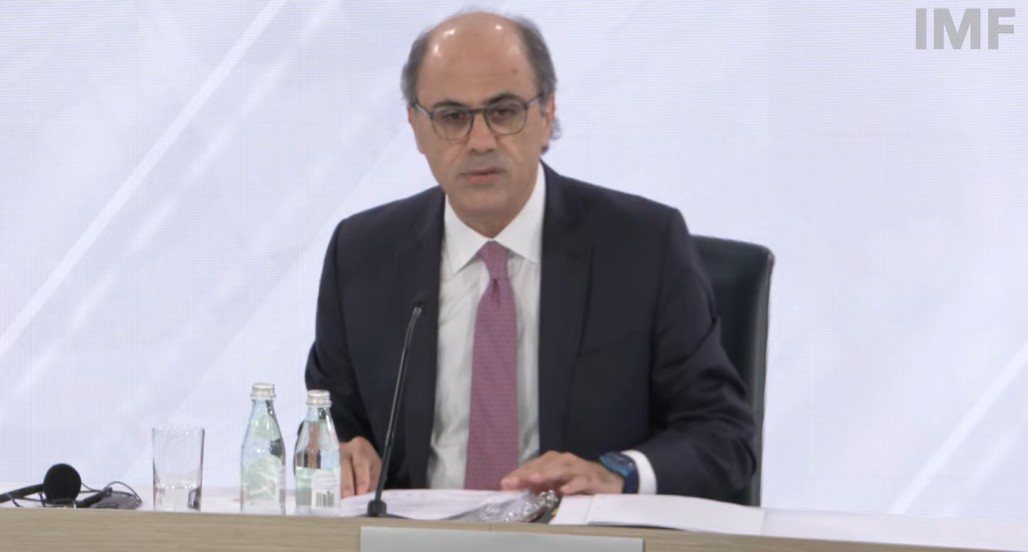Jihad Azour, Director of the Middle East and Central Asia Department at the International Monetary Fund (IMF), emphasized that Egypt’s economy has shown tangible improvement over the past two years following the implementation of its economic reform program. He noted that macroeconomic indicators have strengthened, with inflation declining notably and projected to reach approximately 11.8% next year—a significant drop compared to previous levels.
Azour stated in a media briefing that economic growth has also improved, with GDP expansion expected to reach around 4.3% in the fiscal year 2024/2025, rising to 4.5% in 2025/2026. He added that public debt levels are gradually decreasing compared to earlier years, reflecting improved fiscal discipline.
He highlighted that the IMF’s program with Egypt has made important strides in securing economic stability. A central focus of the initiative is supporting growth and job creation by boosting the private sector’s role. This requires enhancing the business environment and expanding private sector participation in the economy through a redefined state role—shifting from competitor to enabler. Additionally, a clear strategy is being developed to stimulate investment and restructure public institutions.
Discussions are currently underway between Egyptian government officials and IMF staff to determine the timing of the fifth and sixth reviews by the fund’s mission team. Regarding a potential extension of the program, Azour clarified that no extension is currently necessary. Instead, efforts are concentrated on accelerating two key areas: strengthening private sector engagement to generate employment and shield the economy from regional and global volatility, and reinforcing social protection systems by redirecting public spending to ensure support reaches the most vulnerable groups.
On the regional situation, Azour addressed the economic spillovers from developments in Gaza, noting that countries in the region, including Egypt and Jordan, have demonstrated resilience amid multiple geopolitical and economic shocks. The initial negative impact on Egypt included a decline in Suez Canal revenues by about $7 billion, along with indirect effects on tourism due to reduced Red Sea trade activity.
Despite these challenges, Egypt’s economy has adapted effectively, and growth rates are recovering. Jordan, too, has shown resilience and economic durability. Azour concluded that any improvement in the regional geopolitical landscape would yield positive economic outcomes, but sustaining these gains depends on accelerating structural reforms—particularly those aimed at empowering the private sector in Egypt.
— news from أموال الغد
— News Original —
صندوق النقد: برنامجنا مع مصر حقق تقدماً مهماً في تأمين الاستقرار الاقتصادي
57 n nأكد جهاد أزعور، مدير إدارة الشرق الأوسط وآسيا الوسطى في صندوق النقد الدولي، أن الاقتصاد المصري شهد تحسناً ملموساً خلال العامين الماضيين منذ تفعيل برنامج الإصلاح الاقتصادي، الذي ساهم في تحسين المؤشرات الكلية، موضحاً أن مستويات التضخم تراجعت بشكل ملحوظ، ومن المتوقع أن تبلغ نحو 11.8% خلال العام المقبل، وهو انخفاض واضح مقارنة بالسنوات السابقة. n nوأشار «أزعور» في تصريحات صحفية، إلى أن معدلات النمو الاقتصادي سجلت تحسناً، إذ يتوقع أن يبلغ معدل النمو في السنة المالية 2024/2025 نحو 4.3%، على أن يرتفع إلى 4.5% في 2025/2026، لافتاً إلى أن مستويات الدين تشهد أيضاً انخفاضاً تدريجياً مقارنة بالسنوات الماضية. n nوأوضح أن برنامج صندوق النقد مع مصر حقق تقدماً مهماً في تأمين الاستقرار الاقتصادي، مشيراً إلى أن أحد محاوره الأساسية يتمثل في دعم النمو وخلق فرص العمل عبر تعزيز دور القطاع الخاص، وهو ما يتطلب تحسين بيئة الأعمال، وإتاحة مساحة أكبر للقطاع الخاص في الاقتصاد المصري، من خلال إعادة تحديد دور الدولة ليكون داعماً لا منافساً، ووضع استراتيجية واضحة لتحفيز الاستثمار وتحول المؤسسات العامة. n nوأضاف أن جميع هذه النقاط تُناقش حالياً بين فريق الحكومة المصرية وفريق عمل الصندوق، على أن يُحدد بناءً على ذلك توقيت زيارة البعثة لإجراء المراجعتين الخامسة والسادسة. n nوفيما يتعلق بإمكانية تمديد البرنامج، أوضح «أزعور» أنه لا توجد ضرورة للتمديد حالياً، مؤكداً أن العمل يتركز على تسريع محورين أساسيين: تعزيز دور القطاع الخاص لخلق فرص عمل وحماية الاقتصاد من التقلبات الإقليمية والدولية، وتعزيز منظومة الحماية الاجتماعية عبر إعادة توجيه الإنفاق العام لضمان وصول الدعم للفئات الأكثر احتياجاً. n nوتطرق إلى انعكاسات الأوضاع في غزة على مصر والمنطقة، قائلاً إن دول المنطقة تمكنت من التكيف مع عدد من الصدمات الاقتصادية والجيوسياسية خلال العامين الماضيين، وهو ما أبرز مرونة اقتصادات مثل مصر والأردن. وأوضح أن الانعكاس السلبي الأول على مصر تمثل في انخفاض عائدات قناة السويس بنحو 7 مليارات دولار، إلى جانب التأثير غير المباشر على قطاع السياحة نتيجة تراجع حركة التجارة عبر البحر الأحمر. n nوأكد أن الاقتصاد المصري نجح في التكيف مع هذه التحديات، وعادت معدلات النمو للارتفاع مجدداً، مشيراً إلى أن الأردن أيضاً أظهر قدرة على التكيف واستمرار متانة اقتصاده. وختم أزعور بالتأكيد على أن أي تحسن في الوضع الجيوسياسي بالمنطقة ستكون له انعكاسات إيجابية، إلا أن تعزيز هذه المكاسب يبقى مرتبطاً بتسريع وتيرة الإصلاحات الاقتصادية، ولا سيما في مجال تعزيز دور القطاع الخاص في مصر.
